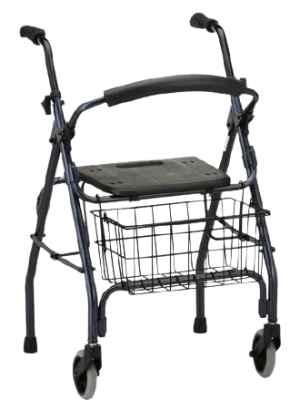Brookhaven, New York Feb 27, 2023 (Issuewire.com) - As we age, it's common for our mobility to become more limited. This can be due to a variety of factors, such as arthritis, injury, or simply the natural effects of aging. While this can be frustrating and even isolating, there are ways to maintain or even improve our mobility as we get older. One tool that can be especially helpful in this regard is a walker.
Walkers are devices that provide support and stability as we walk, helping to reduce the risk of falls and making it easier to get around. There are many different types of walkers available, each with its own unique features and benefits. In this blog post, we'll go over some of the best walkers for seniors, so you can find the one that best fits your needs.
- Traditional Walkers
Traditional walkers are the most basic type of walker, consisting of a lightweight frame with four legs and handgrips. They are designed to be easy to use and maneuver, and they provide support and stability when walking.
One of the benefits of traditional walkers is that they are lightweight and portable, making them easy to take with you wherever you go. They are likewise generally cheap, settling on them a decent decision for those on a tight spending plan.
However, traditional walkers do have some limitations. They also do not provide as much support as some other types of walkers.
- Rollators
Rollators are similar to traditional walkers, but they have wheels instead of legs. This makes them easier to use on uneven terrain and over longer distances, and they can be pushed or pulled as needed.
Rollators also often have additional features, such as a built-in seat and a basket or pouch for carrying items. This can make them more versatile and convenient to use.
One of the drawbacks of rollators is that they tend to be heavier and bulkier than traditional walkers, which can make them less portable. They also tend to be more expensive.
- Knee Walkers
Knee walkers, also known as knee scooters, are a type of walker that is designed to be used while kneeling. They have a platform for the user to rest their injured leg on, and they are propelled forward using the healthy leg.
Knee walkers are a good choice for those who have an injury to one leg and need to keep weight off of it. They are also easier to use than crutches, as they allow the user to maintain a more upright posture and use their hands for tasks.
However, knee walkers can be difficult to use for those who have limited mobility in both legs, and they may not provide as much support as other types of walkers.
- Walkers with Wheels and Seats
Walkers with wheels and seats are a type of rollator that also has a built-in seat and backrest. This makes them a good choice for those who need a place to rest or who may have difficulty standing for long periods of time.
Walkers with wheels and seats are generally more expensive than traditional walkers or rollators, and they tend to be heavier and bulkier as well. However, they can be very convenient and comfortable to use, especially for those who have limited mobility or who need to take frequent breaks.
Benefits of Walker
Walkers are an essential mobility aid for many seniors, providing support and stability as they walk and reducing the risk of falls. Here are some of the key benefits of using a walker for seniors:
- Improved mobility and independence: Walkers can make it easier for seniors to get around and do the things they enjoy, helping to improve their mobility and independence.
- Reduced risk of falls: Falls are a common cause of injury in seniors, and a walker can help reduce the risk of falls by providing additional support and stability.
- Pain relief: For seniors with conditions like arthritis or osteoporosis, a walker can help reduce pain and discomfort when walking by providing support and reducing the amount of weight bearing on affected joints.
- Improved cardiovascular health: Regular exercise, including walking, is important for maintaining good cardiovascular health. A walker can make it easier and more comfortable for seniors to walk, which can help them stay active and healthy.
- Socialization and mental health: Walking with a walker can provide seniors with an opportunity to socialize with others and get out of the house, which can have positive effects on their mental health and well-being.
- Safety: Walkers can help seniors navigate unfamiliar or challenging environments with confidence, improving their overall safety.
- Cost-effectiveness: Walkers are a relatively inexpensive mobility aid, and they can be a cost-effective solution for seniors who need additional support when walking.
Conclusion
Walkers are an essential mobility aid for many seniors, providing support and stability as they walk and reducing the risk of falls. There are several types of walkers available, including traditional walkers, rollators, knee walkers, walkers with wheels and seats, and walking canes. Each type of walker has its own unique features and benefits, and it is important for seniors to choose the one that best fits their needs and lifestyle. Some of the key benefits of using a walker for seniors include improved mobility and independence, reduced risk of falls, pain relief, improved cardiovascular health, socialization and mental health, safety, and cost-effectiveness.
Media Contact
Axiom Medical Supplies *****@gmail.com 9175646367 1005 Manhattan Ave, Brooklyn, NY 11222, United States https://axiommedicals.com/










